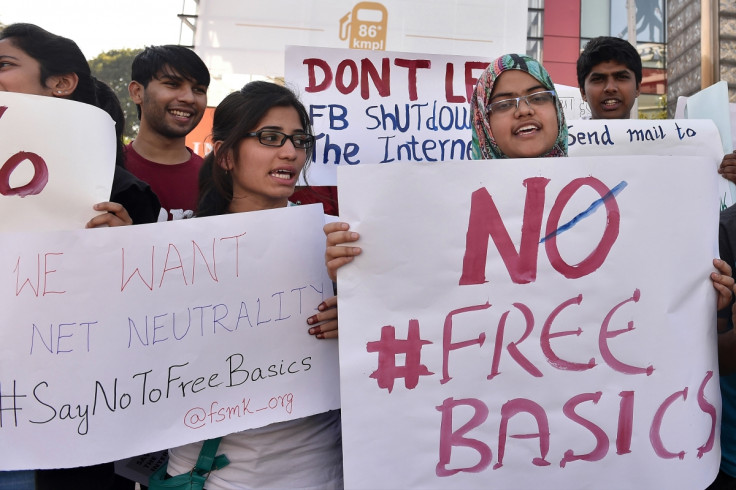Free Basics: Why has India blocked Facebook's free Internet scheme for marginalised people?

On 8 February India's telecoms regulator blocked Facebook's Free Basics Internet scheme from operating in the country. The decision comes after months of intense debate on the scheme, with many arguing that it violated the concept of net neutrality.
The Free Basics scheme was designed to offer restricted internet access free of cost to some mobile users in an attempt to bring it to some of the most marginalised and poorest parts of the country.
However, the controversial scheme was met with intense backlash in India, with many arguing that it violated "net neutrality" – the principle that the Internet should be available to everyone on equal terms.
What were people saying against the Free Basics scheme?
More than 500 organisations signed an open letter to Indian Prime Minister Narendra Modi, urging him to uphold net neutrality in light of Facebook's new scheme in India. The letter, organised by campaign group Save The Internet, gained signatures from 1,000 people and 528 start-ups. Meanwhile, nearly 400,000 people signed a petition started by the group calling on India's Telecom Regulatory Authority to uphold net neutrality.
A spokesperson for Save The Internet said: "Free Basics isn't about bringing people online. It's about keeping Facebook and its partners free, while everything else remains paid. Users who pay for internet access can still access Free Basics for free, giving Facebook and its partners an advantage. Facebook gets access to all the usage data and usage patterns of all the sites on Free Basics. No website that wants to compete with Facebook will partner with them because it will have to give them user data. Facebook gives this data to the NSA and this is a security issue for India."
Siddhartha, a member of Free Software movement of India, told the Economic Times: "Facebook misinformed and underinformed its users about Free Basics. Free Basics is nothing without any data connection. It doesn't give internet, it gives Facebook services."
Renata Avila, programme manager of the World Wide Web Foundation, said about Telecom Regulatory Authority of India (TRAI) decision: "The message is clear: We can't create a two-tier Internet – one for the haves, and one for the have-nots. We must connect everyone to the full potential of the open web. We call on companies and the government of India to work with citizens and society to explore new approaches to connect everyone as active users, whether through free data allowances, public access schemes or other innovative approaches."
What was Facebook's defence for the Free Basics scheme?
To explain the scheme, Facebook said: "Free Basics makes the Internet accessible to more people by providing them access to a range of free basic services like news, maternal health, travel, local jobs, sports, communication and local government information."
Addressing some of the criticism about Free Basics in the net neutrality debate, Facebook founder Mark Zuckerberg said: "The internet is one of the most powerful tools for economic and social progress. It gives people access to jobs, knowledge and opportunities. It gives to the voiceless in our society, and it connects people with vital resources for health and education. I believe everyone in the world deserves access to these opportunities."
He went on to say that in many countries there are "big social and economic obstacles to connectivity" and that this meant that the internet wasn't affordable for everyone. He said that women and the poor are those most likely to be "excluded and further disempowered by lack of connectivity", which is the reason why Free Basics had been created. Zuckerberg said that the scheme lowered the cost of accessing the internet and raised awareness about the internet's value.
Addressing concerns of net neutrality, Zuckerberg said that he fully supported net neutrality and that Facebook was "fully committed" keeping the internet "open". However, he said that net neutrality did not conflict with getting more people connected.
"These two principles – universal connectivity and net neutrality – can and must coexist," said Zuckerberg. "To give more people access to the internet, it is useful to offer some services for free. If someone can't afford to pay for connectivity, it is always better to have some access than none at all. Arguments about net neutrality shouldn't be used to prevent the most disadvantaged people in society from gaining access or deprive people of opportunity."
Why did the TRAI block Free Basics?
Sudhir Gupta, TRAI secretary, said: "TRAI has today issued the 'Prohibition of Discriminatory Tariffs for Data Services Regulations 2016' that disallows service providers offering or charging discriminatory tariffs for data services on the basis of content being accessed by a consumer.
"While formulating the regulations, the authority has largely been guided by the principles of net neutrality seeking to ensure that consumers get unhindered and non-discriminatory access to the internet."
How did Facebook respond to the TRAI verdict?
A spokesperson for Facebook said: "Our goal with Free Basics is to bring people online with an open, non-exclusive and free platform. While disappointed with the outcome, we will continue our efforts to eliminate barriers and give the unconnected an easier path to the internet and the opportunities it brings."
© Copyright IBTimes 2024. All rights reserved.







